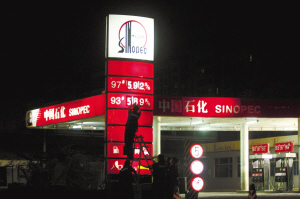China raised retail fuel prices?Monday?at a rate far slower than the surging international crude prices and far lower than analysts' speculations in an attempt to minimize the impact of a fuel price rise on farmers during the harvesting season. The move also shows its lack of faith in the sustained growth of international crude prices, analysts said.

"The global economic recovery does not support a sizable rebound in crude prices," Xu Kunlin, deputy director of the pricing department of the National Development and Reform Commission (NDRC), the country's top economic planner, told a news briefing yesterday.
"The skyrocketing international crude prices in the last month was largely due to a weaker dollar as well as speculative investment money flowing into oil futures," Xu said.
"It is possible that the international crude prices will fall in the near future," Xu said.
China increased diesel and gasoline prices by 6 to 7 percent from yesterday, the second and biggest increase this year, relieving some pressure on refiners but adding to the burden on farmers and small businesses.
It came after international crude prices climbed above US$66 a barrel to the highest in seven months, the biggest one-month gain (about 30 percent) in a decade. The increase was smaller than the widely speculated 10 percent.
"Global crude prices, to which China's fuel prices are linked, rose to around US$57 a barrel from US$45 since the government last raised prices on March 25," an NDRC statement released on Sunday said.
The government cut fuel prices by as much as 3 percent in January while raising them by as much as 5 percent on March 25 to reflect movements in global crude prices. Now the prices are at their highest since December and are slightly lower than the prices set last June, when crude was near its record high of US$147 a barrel.
However, the increase is not enough to satisfy the country's refiners. Su Shulin, chairman of top State refiner Sinopec, said on May 22 that the company would lose money turning oil into fuel should crude trade above $60 a barrel and the government prevent it from increasing retail prices.
An executive with Sinopec told Reuters that the company was grudgingly positive about the rise. "It's a good thing for us. It shows the government is moving in the right direction. But if $66 crude oil holds, we will need another similar increase in the near future to break even."
(China Daily June 2, 2009)